- Home
- Franz Kafka
Letters to Milena Page 2
Letters to Milena Read online
Page 2
I would like to thank the staff of Schocken Books for bringing this book to press, in particular Sara Bershtel for her discerning and forbearing editing and Ed Cohen for his enthusiastic care of the text. Many thanks to Josef Čermák for his help with passages in Czech; I am also very grateful to Mark Anderson for his gracious and insightful assistance.
P.B.
LETTERS TO MILENA
[April 1920]
Meran-Untermais, Pension Ottoburg1
Dear Frau Milena
The rain which has been going on for two days and one night has just now stopped, of course probably only temporarily, but nonetheless an event worth celebrating, which I am doing by writing to you. Incidentally the rain itself was bearable; after all, it is a foreign country here, admittedly only slightly foreign, but it does the heart good. If my impression was correct (evidently the memory of one single meeting, brief and half-silent, is not to be exhausted), you were also enjoying Vienna as a foreign city, although later circumstances may have diminished this enjoyment, but do you also enjoy foreignness for its own sake? (Which might be a bad sign by the way, a sign that such enjoyment should not exist.)
I’m living quite well here, the mortal body could hardly stand more care, the balcony outside my room is sunk into a garden, overgrown and covered with blooming bushes (the vegetation here is strange; in weather cold enough to make the puddles freeze in Prague, blossoms are slowly unfolding before my balcony), moreover this garden receives full sun (or full cloud, as it has for almost a week)—lizards and birds, unlikely couples, come visit me: I would very much like to share Meran with you, recently you wrote about not being able to breathe, that image and its meaning are very close to one another and here both would find a little relief.
With cordial greetings,
F Kafka2
[April 1920]
Meran-Untermais, Pension Ottoburg
Dear Frau Milena
I wrote you a note from Prague and then from Meran. I have not received any answer. It so happens the notes did not require a particularly prompt reply and if your silence is nothing more than a sign of relative well-being, which often expresses itself in an aversion to writing, then I am completely satisfied. However, it is also possible—and this is why I am writing—that in my notes I somehow hurt you (what a clumsy hand I must have had, if that should have happened against all my intentions) or else, which would of course be much worse, the moment of quiet relaxation you described has again passed and bad times have again descended upon you. In case the first is true I don’t know what to say, that’s so far from my thoughts and everything else is so close, and for the second possibility I have no advice—how could I?—but just a simple question: Why don’t you leave Vienna for a little while? After all, you aren’t homeless like other people. Wouldn’t some time in Bohemia give you new strength? And if, for reasons unknown to me, you might not want to go to Bohemia, then somewhere else, maybe even Meran would be good. Do you know it?
So I’m expecting one of two things. Either continued silence, which means: ‘Don’t worry, I’m fine.’ Or else a few lines.
Cordially Kafka
It occurs to me that I really can’t remember your face in any precise detail. Only the way you walked away through the tables in the café, your figure, your dress, that I still see.
[Meran, April 1920]
Dear Frau Milena, You are toiling over the translation in the middle of the dreary Vienna world.3 Somehow I am both moved and ashamed. You will have probably already received a letter from Wolff, at least he wrote to me some time ago concerning such a letter.4 I did not write any novella entitled ‘Murderers’ (although this was apparently advertised in a catalog)—there is some misunderstanding, but since it’s supposed to be the best one of the lot maybe it’s mine after all.
Judging from your last two letters anxiety and worry seem to have left you once and for all, this probably applies to your husband as well, how much I wish it for both of you.5 I recall a Sunday afternoon years ago, I was creeping along the wall of houses on the Franzensquai and ran into your husband, heading toward me in much the same way—two headache experts, naturally each after his very own fashion. I don’t remember whether we then went on together or passed each other by, the difference between these two possibilities could not have been very great. But that is past and should remain deep in the past. Is it nice at home?
Cordial greetings
Kafka
[Meran, April 1920]
So it’s the lung. I’ve been turning it over in my mind all day long, unable to think of anything else. Not that it alarms me; probably and hopefully—you seem to indicate as much—you have a mild case, and even full-fledged pulmonary disease (half of western Europe has more or less deficient lungs), as I have known in myself for 3 years, has brought me more good things than bad. In my case it began about 3 years ago with a violent hemorrhage in the middle of the night. I was excited as one always is by something new, naturally somewhat frightened as well; I got up (instead of staying in bed, which is the prescribed treatment as I later discovered), went to the window, leaned out, went to the washstand, walked around the room, sat down on the bed—no end to the blood. But I wasn’t at all unhappy, since by and by I realized that for the first time in 3, 4 practically sleepless years there was a clear reason for me to sleep, provided the bleeding would stop. It did indeed stop (and has not returned since) and I slept through the rest of the night. To be sure, the next morning the maid showed up (at that time I had an apartment in the Schönborn-Palais), a good, totally devoted but extremely frank girl, she saw the blood and said: ‘Pane doktore, you’re not going to last very long.’6 But I was feeling better than usual, I went to the office and did not go see the doctor until later that afternoon. The rest of the story is immaterial. I only wanted to say: it’s not your illness which scares me (especially since I keep interrupting myself to search my memory, and underneath all your fragility I perceive something like a farm girl’s vigor and I conclude: no, you’re not sick, this is a warning but no disease of the lung), anyway it’s not that which scares me, but the thought of what must have preceded this disturbance. For the moment, I’m simply ignoring everything else in your letter, such as: not a heller—tea and apple—daily from 2 to 8—these are things I cannot understand which evidently require oral explanation. So I’ll ignore all that (though only in this letter, as I cannot forget them) and just recall the explanation I applied to my own case back then and which fits many cases.7 You see, my brain was no longer able to bear the pain and anxiety with which it had been burdened. It said: ‘I’m giving up; but if anyone else here cares about keeping the whole intact, then he should share the load and things will run a little longer.’ Whereupon my lung volunteered, it probably didn’t have much to lose anyway. These negotiations between brain and lung, which went on without my knowledge, may well have been quite terrifying.
And what are you going to do now? The fact that you’re being looked after is probably insignificant. Anyone who cares about you has to realize that you need a little looking after, nothing else really matters. So is there salvation here as well? I said already—no, I’m not in the mood for making jokes, I am not being funny in the least and will not be funny again until you have written how you are planning a new and healthier way of life. After your last letter I’m not going to ask why you don’t leave Vienna for a while, now I understand, but after all there are beautiful places close to Vienna as well, which offer many different cures and possibilities of care. Today I’m not going to write about anything else, I don’t have anything more important to bring up. I’m saving everything else for tomorrow, including my thanks for the issue of Kmen which makes me moved and ashamed, happy and sad. No, there is one other thing: If you waste as much as one minute of your sleep on the translation, it will be as if you were cursing me. For if it ever comes to a trial there will be no further investigations; they will simply establish the fact: he robbed her of her sleep. With that I shall be condemne
d, and justly so. Thus I’m fighting for myself when I ask you to stop.
[Meran, end of April 1920]
Dear Frau Milena, today I’d like to write about something else but can’t. Not that this really bothers me; if it did then I would write something else, but now and then a deck chair really should be ready for you somewhere in the garden, half in the shade, with about 10 glasses of milk within easy reach. It might even be in Vienna, even now in the summer—but without hunger and in peace. Is this impossible? And is there no one to make it possible? And what does the doctor say?
When I pulled your translation out of the large envelope, I was almost disappointed. I wanted to hear from you and not the voice from the old grave, the voice I know all too well. Why did it have to come between us? Then I realized that this same voice had also come between us, as a mediator. But apart from that it is inconceivable to me that you would take on such a troublesome task, and I am moved by your faithfulness toward every little sentence, a faithfulness I would not have thought possible to achieve in Czech, let alone with the beautiful natural authority you attain. German and Czech so close to each other? But however that may be, the story is in any case abysmally bad, which I could prove to you, dear Frau Milena, with unparalleled ease, except that my disgust would outweigh the evidence. Naturally the fact that you like the story gives it some value, although it also makes my view of the world a little dimmer. No more about that. Wolff will send you the Country Doctor, I have written to him.9
Of course I understand Czech. I’ve meant to ask you several times already why you never write in Czech. Not to imply that your command of German leaves anything to be desired. Most of the time it is amazing and on those occasions when it does falter, the German language becomes pliant just for you, of its own accord, and then it is particularly beautiful, something a German doesn’t even dare hope for; a German wouldn’t dare write so personally. But I wanted to read you in Czech because, after all, you do belong to that language, because only there can Milena be found in her entirety (the translation confirms this), whereas here there is only the Milena from Vienna or the Milena preparing for Vienna. So Czech, please. And also the feuilletons you mentioned. Even if they are shabby, after all, you managed to read through the shabbiness of my story—how far I don’t know. Maybe I can do the same; however, if I can’t make it through to the end at least I’ll get stuck in the best possible prejudice.
You ask about my engagement.10 I was engaged twice (or actually three times, twice to the same girl), so three times I have been separated from marriage by only a few days. The first is completely over (I hear there’s already a new marriage and even a small boy), the second is still alive although without any prospect of marriage, so it really isn’t alive or rather it’s living an independent life at the cost of the people involved. On the whole I have found here and elsewhere that men may suffer more, or if you prefer, they have less resistance in these matters; women, however, always suffer without guilt and not just because they ‘can’t do anything about it’ but in the strictest sense of the word, which may nonetheless lead to the ‘can’t do anything about it.’ Incidentally, brooding over these things is useless. It’s like trying to smash a single cauldron in hell; first, the enterprise won’t succeed, and second, if it does succeed, one will be consumed by the glowing effluent, while hell remains intact in all its glory. The problem must be approached differently.
In any case the first thing is to lie down in a garden and extract as much sweetness as possible from the ailment, especially if it’s not a genuine disease. There’s a lot of sweetness in that.
FranzK.
[Meran, April–May 1920]
Dear Frau Milena,
To begin with, so that you don’t deduce it from my letter against my will: for about 14 days now I have had increasing insomnia, I generally don’t take it badly, times like this come and go. They also always have a few more explanations than they really need (this is ridiculous, but according to Baedeker it can even be the air in Meran). And even if they frequently are just barely visible, all these causes can still make one as dull as a block of wood and at the same time as restless as a beast of the forest.
However, I do have one compensation. You have slept peacefully, even if somewhat ‘oddly,’ even if yesterday you were still ‘out of sorts’—nonetheless your sleep was peaceful. So when sleep passes over me in the night, I know where it is headed and accept this. Of course it would be stupid to resist, sleep is the most innocent creature there is and a sleepless man the most guilty.
And you thank this sleepless man in your last letter. If an uninitiated stranger were to read it, he’d have to think: “What a man! He must have moved mountains here.” But meanwhile he hasn’t done a thing, hasn’t lifted a finger (except to write), is living off milk and good things—without always (although often) seeing ‘tea and apples’—and in general he lets things take their course and leaves the mountains alone. Do you know the story of Dostoyevsky’s first success?11 It encompasses a great many things; what’s more, I cite it only because the great name makes it easy to do so, for a story from next door or even closer would have the same significance. Incidentally my memory of the story, and even the names, is inexact. When Dost wrote his first novel Poor Folk, he was living with his friend Grigoriev, a man of letters. The latter watched for months as the written pages accumulated on the desk, but didn’t receive the manuscript until it was finished. He read the novel, was delighted and took it to Nekrasov, a famous contemporary critic, without saying anything to D. That night at 3 o’clock the doorbell rings at D’s. It’s Gr and N, they push their way into the room, embrace and kiss D. Nekrasov, who hadn’t known him before, calls him the hope of Russia, they spend one or two hours talking mostly about the novel and don’t leave until morning. D, who always described this night as the happiest in his life, leans out the window to watch them leave, loses control and starts to cry. His basic feeling at that moment, which he describes although I forget where, was something like: ‘These wonderful people! They’re so good and noble! And I am so mean! If they could only see inside me! And even if I simply tell them they won’t believe me.’ The fact that D later undertook to emulate them is merely embellishment, merely the last word that youth demands in its invincibility, and is no longer part of my story which consequently ends here. Do you, dear Frau Milena, see the mystery in this story; do you see what reason cannot grasp? I think it is this: As far as we can generalize, Gr and Nekr were certainly no nobler than Dost, but now leave the general overview aside, which even D didn’t demand that night and which is useless in specific cases, concentrate solely on Dost and you will be convinced that Gr and N really were wonderful, that D was impure, infinitely mean, that he would never even come close to catching up with Gr and N, let alone repay them for their monstrously kind, undeserved good deed. You can actually see them from the window as they walk away, thereby indicating their unapproachability.—Unfortunately the meaning of the story is obliterated by the great name Dostoyevsky.
Where did my insomnia lead me? I’m sure to nothing that was not very well meant.
FranzK
[Meran, May 1920]
Dear Frau Milena, just a few words, I’ll probably write you again tomorrow, today I’m writing just for my own sake, just to have done something for myself, just to dispel a little the impression your letter made on me; otherwise it would weigh on me day and night. You really are unusual, Frau Milena, living there in Vienna where you have to put up with this and that, and still finding time in between to wonder that other people—for instance myself—aren’t doing especially well, and that one night I sleep a little worse than the night before. In this matter my 3 girlfriends here (3 sisters, the oldest 5 years old) have a healthier outlook, they want to throw me into the water at every opportunity, whether we’re by the river or not, and not because I did something mean to them, far from it. When grown-ups threaten children that way then of course it’s all in play and love and means something like: Now l
et’s go ahead and say the most impossible things just for fun. But children take everything seriously and do not recognize impossibility, they can fail ten times in an attempt to knock something over and still be convinced that the next try will succeed; they don’t even realize that their earlier attempts were unsuccessful. Children become uncanny whenever their words and intentions are furnished with the wisdom of an adult. When such a small four-year-old girl—still a little baby-bellied, at the same time strong as a bear—who doesn’t seem to be there for any other purpose than to be kissed and hugged, attacks, and her two sisters join in on the right and on the left, and any retreat back is cut off by the railing, and when the friendly father and the soft pretty fat mother (standing by the stroller of her fourth) just smile from afar without wanting to help, then it’s practically all over and it’s virtually impossible to describe how one managed to escape after all. Without any apparent reason, these sensible or intuitive children wanted to knock me over, maybe because they considered me superfluous, even though they knew less about me than your letters and my replies.

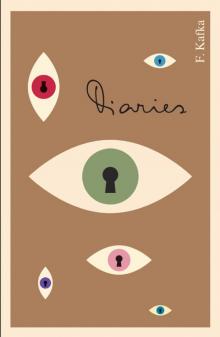 Diaries of Franz Kafka
Diaries of Franz Kafka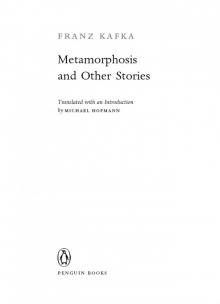 Metamorphosis and Other Stories
Metamorphosis and Other Stories The Castle: A New Translation Based on the Restored Text
The Castle: A New Translation Based on the Restored Text The Complete Stories
The Complete Stories In the Penal Colony
In the Penal Colony The Trial
The Trial Amerika
Amerika The Burrow: Posthumously Published Short Fiction
The Burrow: Posthumously Published Short Fiction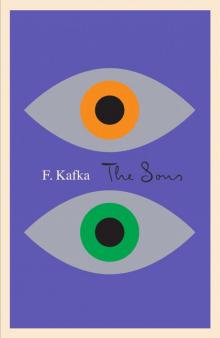 Sons
Sons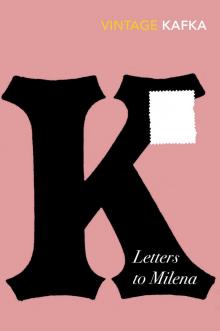 Letters to Milena
Letters to Milena Investigations of a Dog: And Other Creatures
Investigations of a Dog: And Other Creatures Collected Stories
Collected Stories The Great Wall of China
The Great Wall of China The Burrow
The Burrow The Castle
The Castle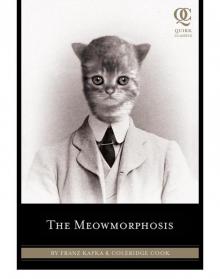 The Meowmorphosis
The Meowmorphosis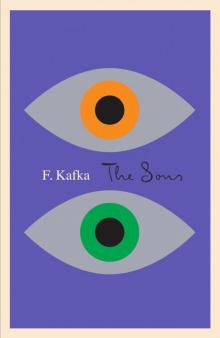 The Sons
The Sons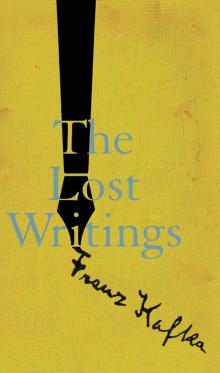 The Lost Writings
The Lost Writings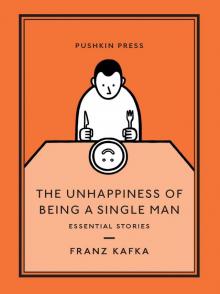 The Unhappiness of Being a Single Man
The Unhappiness of Being a Single Man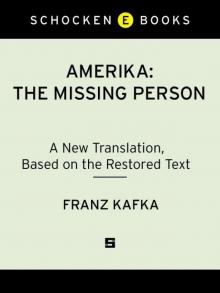 Amerika: The Missing Person: A New Translation, Based on the Restored Text
Amerika: The Missing Person: A New Translation, Based on the Restored Text The Burrow: Posthumously Published Short Fiction (Penguin Modern Classics)
The Burrow: Posthumously Published Short Fiction (Penguin Modern Classics)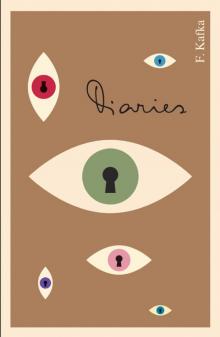 The Diaries of Franz Kafka
The Diaries of Franz Kafka Investigations of a Dog
Investigations of a Dog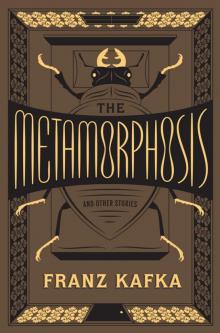 The Metamorphosis and Other Stories
The Metamorphosis and Other Stories The Trial: A New Translation Based on the Restored Text
The Trial: A New Translation Based on the Restored Text